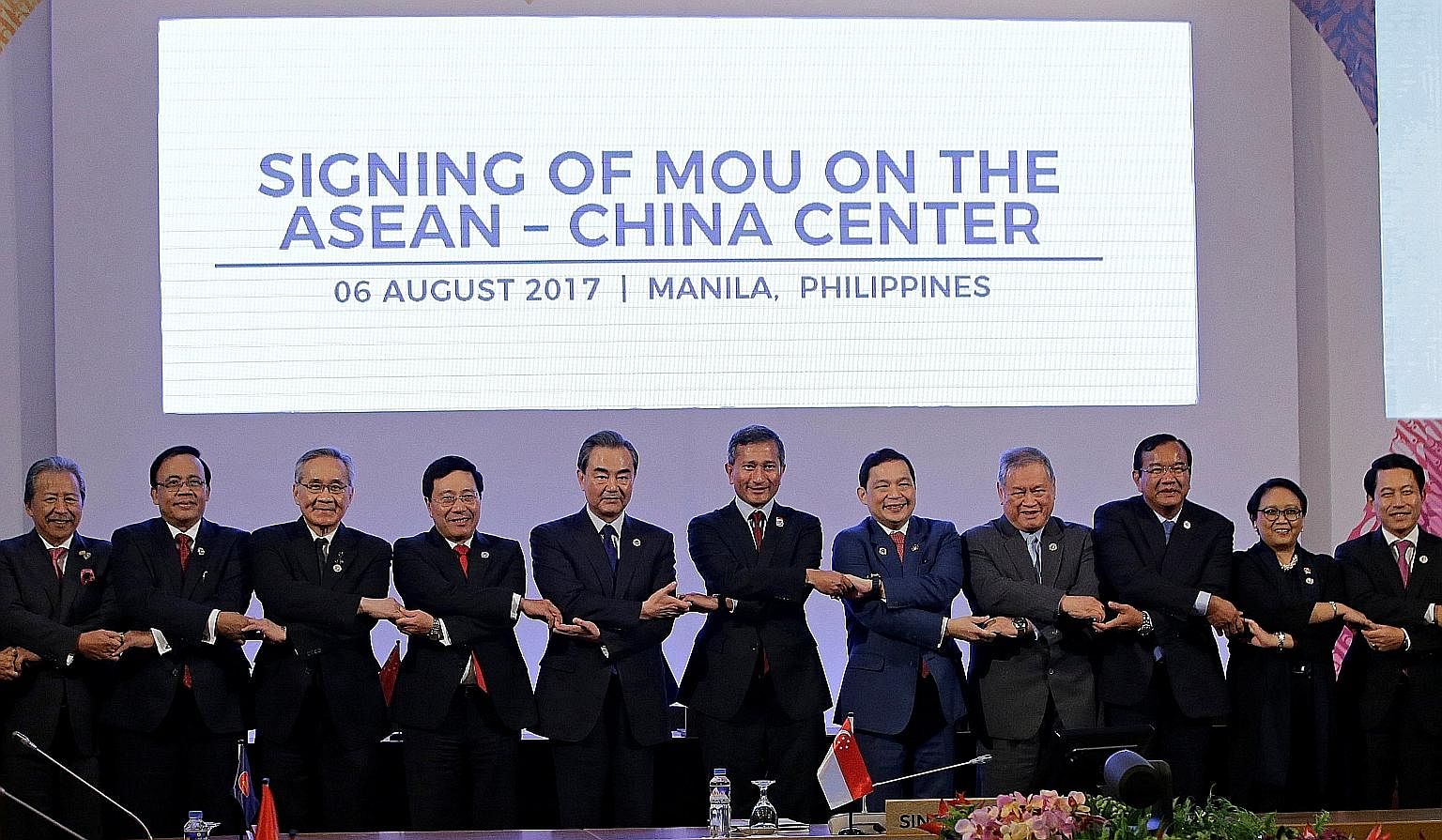Foreign ministers from South-east Asia and China have adopted the framework of a code of conduct (COC) to manage disputes in the South China Sea, paving the way for negotiations on an actual code to take place by the year end.
This came as Asean foreign ministers issued their joint communique that called for non-militarisation in the South China Sea and noting concerns by some ministers on land reclamations in the area.
Chinese Foreign Minister Wang Yi said yesterday that "the finalised framework of the COC on the South China Sea brings stability to the issue, demonstrating a positive momentum. This shows our common wish to protect the peace and stability in the South China Sea".
With the situation "stable and (with) no interference from external parties", negotiations could begin when the leaders of Asean and China meet again in the Philippines in November, Mr Wang added, in reference to the Asean Summit.
By the end of the month, he said, "various parties will together explore the thinking, principles and plan behind the actual negotiations of the COC, so as to make necessary preparations to reach a consensus between Asean and China".
The framework has not been made public, but a leaked two- page blueprint says it aims to promote "mutual trust, cooperation and confidence, prevent incidents, manage incidents should they occur and create a favourable environment for the peaceful resolution of disputes".
It also emphasises that the COC "is not an instrument to settle territorial disputes or maritime delimitation issues".

Speaking to reporters, Singapore's Foreign Minister Vivian Balakrishnan said of the framework: "This is an important document because it represents, in a sense, consensus and more important than that, a commitment on behalf of all the 10 Asean states and China to make progress on this long overdue issue.
-
North Korea: What the latest United Nations sanctions entail
-
EXPORTS
North Korean exports of coal, iron, iron ore, lead, lead ore and seafood are banned. This will deprive the isolated state of one-third of its export earnings estimated at US$3 billion (S$4 billion) a year.
LABOUR
Countries are prohibited from hiring new North Korean labourers, whose earnings are another source of revenue for leader Kim Jong Un's regime.
INVESTMENTS
New joint ventures with North Korea and any new investment in current joint ventures are banned.
BLACKLIST
Nine North Korean officials and four entities, including North Korea's main foreign exchange bank, are added to the United Nations' sanctions blacklist.
MARITIME
Port calls by designated vessels and chartering of North Korea- flagged vessels are prohibited.
CHEMICAL WEAPONS
The deployment and use of chemical weapons are banned.
"It doesn't mean all differences have gone away, but by focusing on the overall dynamics of the relationship, we can achieve positive progress, confidence and move forward."
Finalising the COC has acquired urgency following a series of confrontations between China and some of its smaller South-east Asian neighbours with competing claims to the South China Sea.
The joint communique, which had been delayed from Saturday, said concerns were voiced by some members about "land reclamations and activities in the area which have eroded trust and confidence, increased tension and may undermine peace, security and stability".
It "emphasised the importance of non-militarisation and self-restraint", and also "stressed the importance of undertaking confidence-building and preventive measures" to enhance trust and confidence among parties.
China lays claim to nearly all of the resource-rich waterway, which is also claimed in part by four Asean members - Vietnam, the Philippines, Malaysia and Brunei.
Efforts to finalise the code have dragged on for years without any sign that such an accord will ever be achieved.
In place of a legally binding code, China and the 10-member Asean grouping settled for a mere declaration in 2002 that calls on claimants to exercise restraint and stop new occupation in the South China Sea.
That the framework is broad and leaves wide scope for disagreement has critics raising doubts about how effective the COC will be.
The framework does not outline as an initial objective the need to make the code legally binding and enforceable, or have a dispute resolution mechanism.
Asean has long held the position that the COC must be legally binding, but China opposes this.
Speaking to The Straits Times, Asean Secretary-General Le Luong Minh said: "A framework is a framework. But the framework will hopefully pave the way towards meaningful and substantive negotiations towards the conclusion of a COC."
He added: "It must be able not only to prevent but also to manage incidents of the kind that have taken place so far. For that COC to be effective, it will have to be legally binding."
Reacting to criticisms that the code may end up as a toothless document, Mr Wang said: "As long as we put our signatures on them, we have to take on the responsibility and should abide by them."
Some critics and diplomats told Reuters that China's sudden interest in starting negotiations for the COC after 15 years of delays is intended to buy time to complete its strategic objectives in the South China Sea.
It also comes at a time when the United States - long seen as a crucial buffer against China's maritime assertiveness - is distracted by other issues and providing no real clarity about its security strategy in Asia, thus weakening Asean's bargaining position, Reuters reported.
Said Mr Wang, whose country insists that its activities in the South China Sea are for defence purposes: "We should not prejudge its final outcome."
